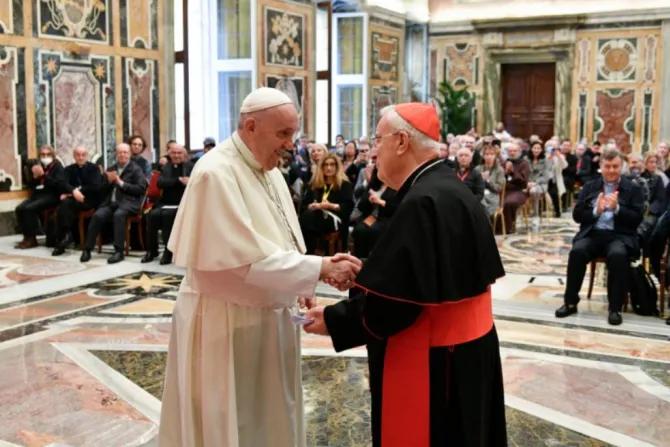Pope Francis greets participants in a conference on the Italian diaspora in Europe at the Vatican’s Clementine Hall, Nov. 11, 2021. | Vatican Media.
Pope Francis said on Thursday that the failure to integrate migrants can lead to serious problems.
Addressing participants in a conference on the Italian diaspora in Europe on Nov. 11, the pope urged countries to take four actions in relation to migrants.

“Welcome, accompany, promote and integrate, the four steps. If we do not achieve integration, there may be problems, and serious ones,” he said.
“I am always reminded of the tragedy of Zaventem: those who did this were Belgians, but the children of migrants who were not integrated, who were ghettoized. Welcome, accompany, promote and integrate.”

The pope was referring to two suicide bombings that took place at Brussels Airport in Zaventem, Belgium, on March 22, 2016.
The perpetrators were Ibrahim El Bakraoui, a 29-year-old who was born in Brussels and held dual Belgian and Moroccan nationality, and Najim Laachraoui, 24, who was born in Morocco but raised in Brussels.

Another suicide bombing took place on the same day at Maalbeek metro station in Brussels. It was carried out by Khalid El Bakraoui, a 27-year-old Belgian national of Moroccan descent.
A total of 32 victims were killed by the three suicide bombers, who together committed the deadliest attack on Belgian soil since World War II.

The pope mentioned the atrocity in a speech to a conference on “Italians in Europe and the Christian mission,” sponsored by the Italian Catholic bishops’ conference and the Migrantes Foundation, and taking place in Rome on Nov. 9-12.
Pope Francis, the son of Italian immigrants to Argentina, highlighted his personal connection to the topic of the Italian diaspora.

“We often see migrants only as ‘others’ distinct from us, as strangers,” he said. “In reality, even reading the data on the phenomenon, we discover that migrants are an important part of ‘us,’ as well as, in the case of Italian emigrants, people close to us: our families, our young students, graduates, unemployed, our entrepreneurs.”
The pope noted that a number of European countries have large Italian communities. They include Germany, Switzerland, France, the UK, and Belgium.

“The reading of Italian emigration to the European continent must make us increasingly aware that Europe is a common home,” he said.
Quoting from his 2020 encyclical Fratelli tutti, he went on: “Even the Church in Europe cannot fail to consider the millions of Italian emigrants and those from other countries who are renewing the face of cities and countries. And, at the same time, they are nourishing ‘the dream of a united Europe, capable of acknowledging its shared roots and rejoicing in its rich diversity.’”

“It is a beautiful mosaic, which must not be scarred or corrupted by prejudice or by hatred veiled in respectability. Europe is called today to revitalize its vocation for solidarity in subsidiarity.”
He praised Italians for witnessing the Catholic faith in other European countries.
“Thanks to their deep-rooted popular religiosity, they have communicated the joy of the Gospel, making visible the beauty of being open and welcoming communities, and sharing the paths of local Christian communities,” he said.

“A style of communion and mission has marked their history, and I hope it will also shape their future. It is a beautiful thread that binds us to the memory of our families.”
The pope stressed the importance of the bond between grandparents and grandchildren.

“In fact, the young Italians who are moving around Europe today are very different, in terms of faith, from their grandparents, yet they are generally very attached to them,” he said.
“And it is crucial that they remain attached to their roots: at the very moment when they find themselves living in other European contexts, the sap they draw from their roots, from their grandparents, a sap of human and spiritual values, is precious.”

The pope said that migrants were a blessing for the Catholic Church in Europe.
“If integrated, they can help breathe the air of a diversity that regenerates unity; they can nourish the face of catholicity; they can bear witness to the apostolicity of the Church; they can generate stories of holiness,” he said.
“Let us not forget, for example, that St. Frances Xavier Cabrini, a nun from [the Italian region of] Lombardy who emigrated among emigrants, was the first citizen saint of the United States of America.”
He expressed satisfaction that the synodal path in Italy would highlight migrants’ contribution to the Church.
“May Bl. John Baptist Scalabrini, whose action among migrants has nourished the mission of the Churches in Italy, and St. Frances Cabrini, patroness of migrants, guide and protect your journey in the Churches of Europe for a new, joyful, and prophetic proclamation of the Gospel,” he concluded.
Source: CNA

